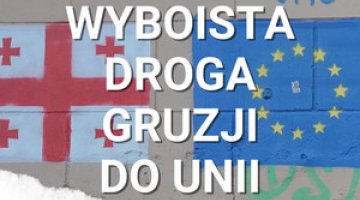Georgia: pre-electoral uncertainty
On 8 October parliamentary elections will be held in Georgia. The main rivals are Georgian Dream (GD), which has been governing since 2012, and the United National Movement (UNM), which held power for nine years before that. GD is presently in by far the stronger position. However the results of the election, and by extension the shape of the future government, remain an open question: a total of 30 groups and parties will stand in the elections, while around 40% of the voters have not yet made up their minds. The campaigning – especially between GD and the UNM – has been strident, and this trend is likely to increase with the approach of the elections, as well as before the expected second round of voting (in the single-mandate seats). A new element in the Georgian context is the appearance of slogans favouring rapprochement with Russia, in the face of uncertainty as to how well the smaller, clearly pro-European groups will do. Both the tensions around the elections, as well as the potential strengthening in Georgia of populist and pro-Russian forces, carry with them the risk of a political crisis after the elections, and may negatively affect the country’s pro-Western foreign policy vector.
The Georgian political scene
Against the background of Eastern Europe, Georgia is a country with quite firmly established democratic mechanisms (such as a relatively high level of social freedoms, and governments being replaced by general elections). At the same time, however, the party system is weak and vulnerable to upheavals. It is characterised by the fragile dominance of the two largest parties, Georgian Dreams and the United National Movement. GD, although it has been in power for four years, is a political project still controlled from behind the scenes and financed by Bidzina Ivanishvili, and not a true party in the classic sense; it lacks institutional structures, a professional staff and decision-making leaders. This is confirmed by its electoral campaign; its driving force and only public face is Ivanishvili, who has emerged from the political shadows for the campaign. The United National Movement is more structured, but lacks clear leadership. The party is managed collectively (by Giga Bokeria and David Bakradze among others), but it is also under the influenced of the exiled Mikhail Saakashvili, whose role in the management of the party is not clear. Both parties and their electorates are sharply divided (in ideological, social and personal terms) by their assessments of the direction and cost of the reforms carried out by the UNM in the years 2003-2012, and also to a lesser extent the country’s relationship to Russia (the UNM is unequivocally anti-Russian).
Among the smaller party groupings, the ones which stand out include the strongly pro-Western groups formerly associated with the Saakashvili camp: the Free Democrats of Irakli Alasania, and the Republican Party of the speaker of parliament David Usupashvili. In the last parliament they were temporarily part of the GD ruling coalition. Among the clearly pro-Russian groups, along with the Democratic Movement of Nino Burjanadze, there is the Patriots’ Alliance of Georgia (an electoral bloc of six groups). Another new party is the populist State for the People founded by the opera singer Paata Burchuladze. According to Georgian Dream, this group is a project of the UNM, aimed at picking up part of the ruling party’s votes.
Altogether, five electoral blocks and twenty-five parties will stand in the upcoming elections, all of which must pass the 5% electoral threshold to enter parliament.
Campaign dominated by GD and UNM settling scores
The campaign is proceeding relatively peacefully, although there have been cases of infringements, such as the use of so-called administrative resources by the ruling party, the harassment of rivals, and isolated cases of UNM local offices being smashed up. After a serious incident in the village of Kortskheli (western Georgia) during the local elections in May this year (an assault on leading UNM politicians by perpetrators linked with GD), there was a risk that the campaign would proceed in an atmosphere of violence. Georgian Dream has accused the UNM of preparing a series of provocations during and after the elections. It cannot be ruled out that the situation will deteriorate as polling day comes closer.
The electoral campaign is dominated by the conflict between GD and UNM. The participants in the debates have focused on emotional score-settling and confronting the achievements and errors of the governments of both parties, as well as attempts to compromise rivals (by disclosing embarrassing recordings, corruption, scandals, etc.). A flagship example is the TV series Herokratia filmed by Gogi Khaindrava, a director and politician linked to Georgian Dream, which has been aired on state television since the beginning of September and portrays the negative side of the Saakashvili government in an extreme fashion, including depictions of the use of violence, including torture, by law enforcement agencies. Most recently the campaign has been revived by the public appearances of Bidzina Ivanishvili, who in recent years had kept to the shadows (he has met voters in the provinces, and been very active in the media); he has sharply attacked not only the United National Movement, but also other groups, including his recent coalition partners.
Foreign policy issues do arise in the discussions, but they are not crucial. Most of the groups favour a continuation of the current pro-Western direction, whereas Georgian Dream (as it did in 2012) is emphasising the need to continue the normalisation of relations with Russia (a course which reflects public expectations). The pro-Russian parties have openly called for cooperation with the West to be broken off, and for Georgia to align with Russia.
Uncertain results
The results of the elections are very difficult to predict. The large number of still undecided voters (38%, according to opinion polls by the National Democratic Institute from June) attests to the crisis in voters’ confidence in the entire political class, their disappointment with both the current and previous governments, and public fatigue at the fierce competition between the two major parties. This opens the field for a batch of smaller groups which are new on the political scene. In addition, the polls published vary considerably; for example, the results for Georgian Dream range from 15 to 30%, and those for the Free Democrats from 4 to 11%. Most likely Georgian Dream will top the poll (due to their high chance of winning in 73 of the single-mandate seats; 77 other seats will be filled on a proportional basis), although they may not win enough to rule outright. Apart from the United National Movement, the best chances lie with the Free Democrats and the party of Burchuladze. There is a high likelihood that pro-Russian forces will enter parliament; in recent months their popularity has risen (especially the Patriots’ Alliance of Georgia), on a wave of disappointment in the West arising from the lack of improvement in the public’s financial situation and the delay in the European Union’s abolition of visas for Georgians.
Within twenty-five days after the end of voting, the second round of elections should take place in those single-mandate constituencies in which none of the candidates gained more than 50% of the vote. In most cases, these will probably be rivalries between candidates of Georgian Dream and the United National Movement.
Prospects and challenges
In the light of past experiences with Georgian democracy, the risk of mass violations in the electoral process is not high. Considering the scale of the tensions between the main political forces and the high degree of their mutual mistrust, however, one cannot rule out the possibility that the situation will worsen and incidents will break out at the local level, particularly in the event of the need for re-runs in the numerous single-member districts. It should then be assumed that the results of the elections will be called into question, and that socio-political unrest will break out. This could be fuelled by Russia, a move which in extreme cases would affect the stability of democracy in Georgia, which from the perspective of the West is one of Georgia’s fundamental achievements.
The best chance of victory in the elections lies with Georgian Dream; the scale of their victory, and the proportions of seats won by the remaining parties remain open, as is the question of independent and coalition governments. Potentially the most important change for Georgia would be the entrance into parliament of strong pro-Russian groups, which cannot be ruled out, both because of the large percentage of undecided voters, as well as the possibility of Russian support, especially in the light of assorted speculation about the possibility of lifting the visa requirement for Georgians to enter Russia at a crucial moment in the election campaign.
Although pro-European aspirations predominate among Georgian society and most of the political class, there is a risk that the forthcoming elections will be a catalyst for a further weakening of the Tbilisi government’s determination to pursue pro-Western policies, and thus the strengthening of the Russian factor in Georgia. This would also represent a continuation of existing trends (growing disappointment in the West, frustration due to the lack of opportunities for Euro-Atlantic integration), which could be strengthened in the event of possible tensions during the elections, weak results for clearly pro-Western forces and good results for pro-Russian forces, especially if it proves necessary to include them in a ruling coalition if GD wins insufficient seats to govern alone.





